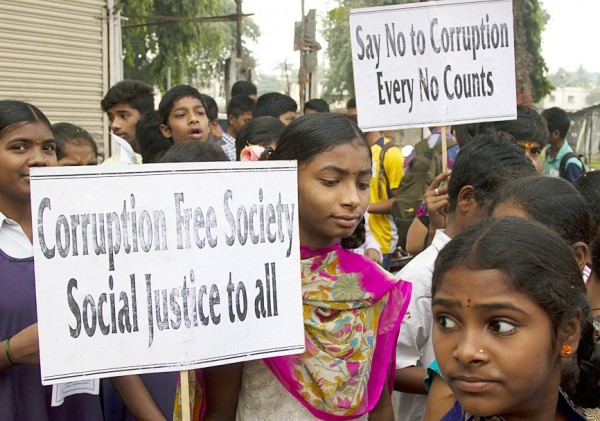《TAIPEI TIMES 焦點》Taiwan places in top three in anti-corruption efforts

Indian students participate in a protest against corruption in Hyderabad on Dec. 3 last year. A survey by Transparency International shows that bribery and other forms of corruption are hindering poverty alleviation and hurting public health by channeling resources away from those who need them. Photo: AP
By Diane Baker / Staff writer, with AFP
While more than a quarter of people living in Asia had to pay a bribe while trying to access a public service in the past year, a new report by Transparency International said that Australia, Sri Lanka and Taiwan, in that order, had the most positive ratings overall in the region across key corruption questions.
In releasing the report, titled People and Corruption: Asia Pacific — Global Corruption Barometer, the Berlin-based watchdog group called on governments to root out endemic graft in the region.
The report surveyed more than 20,000 people in 16 countries in the region, and the authors said the results showed that an estimated 900 million people were forced to pay “tea money” at least once in the previous 12 months.
Bribery rates were highest in India and Vietnam, where nearly two-thirds of respondents said they had to sweeten the deal to access basic services such as public education and healthcare.
In Taiwan, Australia and Sri Lanka, bribery rates were very or fairly low, few people felt that corruption was increasing and many felt empowered to help fight against corruption.
However, there were still areas for improvement in all three, such as poor ratings of government efforts to fight corruption in Taiwan and Australia, and a substantial minority in Sri Lanka who thought the police were highly corrupt.
Japan topped the list of nations with the lowest rates of bribery with just 0.2 percent, compared with Hong Kong (2 percent), South Korea (3 percent), Australia (4 percent) and Taiwan (6 percent), while India scored the highest with 69 percent, followed by Vietnam (65 percent), Cambodia and Pakistan (40 percent) and China (26 percent).
In Taiwan, 26 percent of respondents said they thought corruption had increased recently, compared with 28 percent of Japanese, 46 percent of Hong Kongers and 73 percent of Chinese, although for China the question covered a three-year period.
Asked if they felt the government was doing well or badly in fighting corruption, 54 percent of Taiwanese respondents said badly, compared with 29 percent who said they thought it was doing well. In Hong Kong the respective figures were 60 percent and 37 percent.
However, asked if they felt that ordinary people could make a difference in the fight against corruption, 79 percent of Taiwanese respondents said yes, the second-highest group, coming in just behind Australians at 80 percent.
When it came to perceptions of corruption, Malaysia and Vietnam got the worst ratings from their citizens, who felt graft was widespread and accused their governments of doing little to fight it.
The survey found that police were the most common demanders of kickbacks, with just under a third of people who had come into contact with an officer in the past year saying they had paid a bribe.
However, in Taiwan, those respondents who said they had paid a bribe in the past 12 months, between 6 percent and 15 percent reported doing so for utilities or public schools, and only 1 percent to 5 percent cited the public hospitals, the police or the courts.
The survey said that the poor are hit hardest by corruption, especially in Thailand, India and Pakistan, with 38 percent of respondents saying they had to pay a bribe, while in Vietnam, Myanmar and Cambodia, the reverse was true.
In Taiwan, the survey was conducted on behalf of Transparency International by Taiwan Real Survey Co (全國公信力民意調查股份有限公司), through computer-assisted personal interviewing, between Sept. 23 and Oct. 2 last year, with a sample size of 1,082 people.
新聞來源:TAIPEI TIMES















